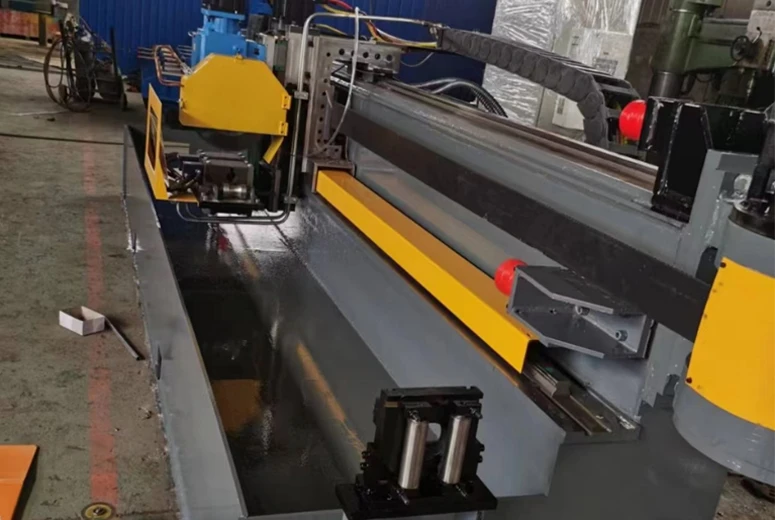High-Quality R Panel Roll Forming Machines Available for Purchase and Customization
The Rise of R Panel Roll Forming Machines A Perfect Solution for Modern Construction
In the fast-evolving world of construction and manufacturing, efficiency, durability, and cost-effectiveness are paramount. One of the most significant advancements to meet these needs is the introduction of R panel roll forming machines. These machines play a vital role in producing R panel roofing and siding, which are increasingly favored in both commercial and residential sectors. This article explores the importance of R panel roll forming machines, their functionalities, and their impact on the construction industry.
What is an R Panel Roll Forming Machine?
An R panel roll forming machine is a specialized piece of equipment designed to convert flat metal sheets into R panels through a continuous bending process. These machines use various rollers and dies to shape metal coils into desired profiles, creating panels that are lightweight yet exceptionally strong. R panels, known for their ribbed structure, provide excellent structural integrity and are particularly useful in roofing and wall applications.
Key Features and Benefits
1. Efficiency Modern R panel roll forming machines are engineered for speed and precision. They can produce high volumes of panels with minimal waste, allowing manufacturers to meet tight construction schedules. Automated systems ensure consistent quality and reduce the need for manual labor.
2. Material Versatility These machines can work with a range of materials, including galvanized steel, aluminum, and other metals. This versatility enables manufacturers to cater to diverse client needs and project requirements. The ability to use various finishes also allows for aesthetic customization.
3. Durability R panels are designed to withstand harsh weather conditions. They are resistant to corrosion, UV radiation, and temperature fluctuations, making them ideal for various applications. The structural integrity provided by roll-forming ensures longevity, reducing the need for frequent repairs or replacements.
4. Cost-Effectiveness Investing in an R panel roll forming machine can lead to significant cost savings. By streamlining production and minimizing waste, manufacturers can decrease operational costs. Additionally, the durability of R panels reduces long-term maintenance expenses for clients.
5. Customization Many modern roll forming machines offer options for customization, enabling manufacturers to produce panels tailored to specific project specifications. This flexibility is crucial in fulfilling the unique demands of different clients and projects.
r panel roll forming machine for sale

Applications in Construction
R panels produced by roll forming machines have a wide array of applications in the construction industry. They are commonly used in
- Commercial Buildings R panels are often employed in warehouses, factories, and retail spaces due to their durability and minimal maintenance requirements. - Residential Projects Emerging trends in home building highlight the use of R panels in modern home design, particularly for roofing and siding. - Industrial Facilities Their strength and resistance to environmental factors make R panels an ideal choice for industrial buildings that require robust construction materials. - Agricultural Buildings R panels are widely used in barns and storage facilities, offering effective insulation and protection.
Environmental Impact
As sustainability becomes a crucial aspect of modern construction, R panel roll forming machines contribute positively by promoting the use of recyclable materials. Many manufacturers are focusing on producing panels from sustainable sources. Additionally, the long lifecycle of R panels minimizes waste in landfills, aligning with green building practices.
The Future of R Panel Roll Forming Machines
The demand for R panel roll forming machines is expected to grow as the construction industry advances. Innovations in technology are continuously improving machine efficiency and capabilities, making it easier for manufacturers to adapt to changing market needs. As new materials and designs emerge, the versatility of roll forming machines will likely position them as essential tools in modern manufacturing.
Conclusion
In summary, R panel roll forming machines represent a significant leap forward in construction technology. Their ability to produce durable, cost-effective, and aesthetically pleasing panels makes them indispensable in various building applications. As construction demands continue to evolve, these machines will play a pivotal role in delivering high-quality materials that meet the standards of efficiency and sustainability. The future of construction is bright, and R panel roll forming machines are at the forefront of this exciting transformation.
-
High Frequency Straight Seam Welded Pipe Production Line-BzZhou Xinghua Machinery Equipment Manufacturing Co., LTD.|Precision Welding, High EfficiencyNewsJul.30,2025
-
High Frequency Straight Seam Welded Pipe Production Line|BzZhou Xinghua|Precision Welding&EfficiencyNewsJul.30,2025
-
High Frequency Straight Seam Welded Pipe Production Line - BzZhou Xinghua|Precision Engineering&EfficiencyNewsJul.30,2025
-
High-Frequency Straight Seam Welded Pipe Production Line-BzZhou Xinghua Machinery Equipment Manufacturing Co., LTD.NewsJul.30,2025
-
High-Frequency Straight Seam Welded Pipe Production Line-BzZhou Xinghua Machinery Equipment Manufacturing Co., LTD.|Precision Manufacturing, High EfficiencyNewsJul.30,2025
-
High Frequency Straight Seam Welded Pipe Production Line-BzZhou Xinghua Machinery Equipment Manufacturing Co., LTD.|Precision Steel Pipe Manufacturing&Industrial EfficiencyNewsJul.29,2025


